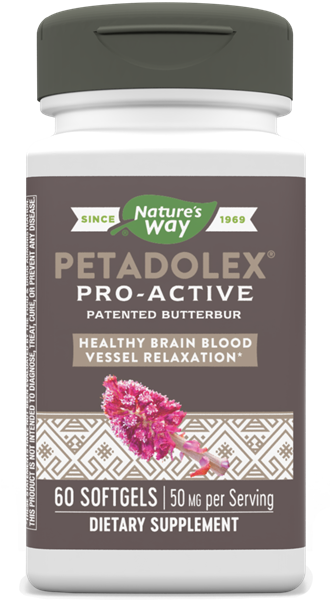
Petadolex® Pro-Active supports healthy blood vessel relaxation in the brain.
Butterbur (Petasites hybridus) contains several compounds with bioactive properties. Two of these compounds, petasin and isopetasin support healthy blood vessel tone.*
Enzymatic Therapy's Petadolex® Pro-Active supplement contains pure butterbur extract to support healthy blood vessel tone in the head.
The patented method of extraction for Petadolex Pro-Active ensures the valuable petasites compounds are captured, while leaving out toxic levels of inherent compounds such as pyrrolizidine alkaloids. This product is tested for pyrrolizidine alkaloids, made possible by using this patented process (U.S. Patent #6,551,626).
For soothing comfort that improves with continued use, trust Petadolex Pro-Active.
Butterbur comes from the butterbur plant (Petasites hybridus), which is a perennial shrub found in Europe, Asia and parts of North America. It grows in wet, marshy soil, damp forests and along rivers and streams. Butterbur has long been used as an herbal treatment for migraines, headaches, asthma, urinary tract infections, wounds, allergies, and stomach upset. Butterbur products may be made from the plant’s root, stem, or leaves.
How butterbur works:
The substances petasin and isopetasin are found in butterbur. While the exact way these compounds work isn’t fully understood, it is believed that they work to reduce inflammation. These actions are thought to help prevent migraine and reduce migraine headaches.
The effectiveness of butterbur in migraine prevention has been evaluated in several research studies. Several trials have compared butterbur to placebo and found that butterbur, specifically the formulation Petadolex®, was significantly more effective in reducing the number of migraines in a month.
Butterbur is sold in a variety of formulations, including capsules, powders, tinctures, and teas. Some of the chemicals in butterbur, called pyrrolizidine alkaloids (PAs), are known to cause liver damage, and only those products labeled or certified as PA-free should be used.
Known side effects from butterbur include:
Burping or belching
Headaches
Itchy eyes
Diarrhea
Difficulty breathing
Drowsiness
Liver toxicity
Fatigue
As with any natural remedy, prescription or over-the-counter treatment, you should first check with your doctor before taking butterbur to learn if it might interact with anything else you’re taking, or learn if it could have a dangerous impact on any condition you have.
Who should not take butterbur:
Women who are pregnant, plan to become pregnant or nursing should not take butterbur. People who are taking other agents that contain the same active ingredients as butterbur, such as borage, gravel root and ragwort, should not use butterbur. People who are allergic to plants such as ragweed, chrysanthemums, marigolds, and daisies may experience an allergic reaction to butterbur.
